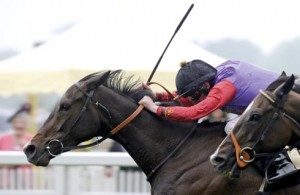The perils of supplement contamination have been thrown into the spotlight recently thanks to Jock Paget and Clifton Promise. But what should riders be looking for? Are you ever really “safe’” to use them?
As Jock Paget said to H&H this week, he’ll “never be safe” in respect to possible contamination.
There is truth in what sounds like a dramatic statement — vets and manufacturers said you can “never be certain” when it comes to supplements and competition. Both Jock and Kevin McNab were cleared after an ongoing scandal in which their horses — Clifton Promise and Clifton Pinot — tested positive for banned drug reserpine at Burghley last year.
It was ruled a supplement, LesstressE, was contaminated at the production stage before use.
In the documents, the FEI Tribunal found that neither Kevin or Jock had shown “negligence” because they couldn’t have ”reasonably known or suspected” that LesstressE would be contaminated with reserpine.
Jock also explained that the New Zealand team vet had approved his use of LesstressE.
“You don’t know what is in them and the contents can vary,” said H&H vet advisor Karen Coumbe.
“It can be extremely difficult to know exactly what is included, so it can be nearly impossible to advise on either their efficacy or safety.
“This recent case makes me more cautious about checking any supplement and considering carefully whether it is reasonable for regular usage.”
No guarantee
Claire Williams from the British Equestrian Trade Association (BETA) said one of the main problems as a rider is that you can never be 100% sure.
“Contamination could happen to anyone,” she said.
“Due to the nature of raw materials, no manufacturer could — or should — guarantee it’s not contaminated by a prohibited substance, many of which occur naturally in the environment. Products are made up from hundreds of raw materials all around the world; contamination can occur at any stage.”
This case is not the only recent contamination issue — last month the Queen’s 2014 Ascot Gold Cup runner-up Estimate was among eight racehorses who tested positive for banned substance morphine — at least four having been fed suspected contaminated Dodson & Horrell Alfalfa Oil Plus.
Dodson & Horrell recalled the batch immediately and traced the source — presumed to be rogue poppy seeds — to the fibre supplier.
Lawyer Jeremy Dickerson, who represented eventer Jock Paget, called for more leniency in racing and equestrian anti-doping rules in cases where fault is accepted by feed suppliers (news, 31 July).
“It illustrates that however reputable your supplier, no-one is immune,” Mr Dickerson told H&H.
Production qualities vary
One of the most shocking things to come out of the Paget and McNab Tribunal papers was the fact the product LesstressE had been produced “with a wooden spoon and plastic bowl” on the “kitchen table” at Trinity Consultants.
“Of course I wouldn’t have used the product if I had known that was the situation,” Jock told H&H.
Ms Williams said when manufacturing supplements, companies must be registered with Trading Standards.
“You’d hope it was all being done professionally — complying with feed hygiene regulations, ingredients lists and use-by dates — but the regulations don’t stress where it’s made,” she added.
But in the FEI papers, Roger Hatch admitted that Trinity Consultants had not applied for a traditional herb certification and that “no good manufacturing policies had been in place”.
Who is accountable?
However, should riders investigate the manufacturer’s background before giving any product to their horses?
“It is the riders’responsibility to look at the label and see what claims are being made,”said Ms Williams.
“Also beware contamination in yards. How many people have a kettle in their tack room for a cup of coffee [which can produce a positive test result] or feed horses titbits?”
Dr Roger Crozet and Dr Brieuc de Moffarts of Twydil vets added that it is the riders’ responsibility to check the FEI clean sport list.
“A thorough discussion with the vet team is important regarding any treatment and the competition calendar,” they said.
“The responsible person is the person who made the mistake, consciously or not.
“Grooms are employees of the rider or the owner and only stick to instructions. They cannot be held accountable unless it can be proven that they committed something wrong on purpose.”
In 2009 Michael Whitaker was suspended for four months after his groom mistakenly fed the wrong supplement — for mares — to his stallion, Tackeray, causing a positive result. Both were later found to be at no fault.
The British Olympic Association said at the time: “The panel noted that there is no reasonable basis for concluding that Whitaker (or his groom) deliberately administered the prohibited substance.”
Tightening of rules?
Another question that has been raised is whether horses running at such a high level really need that many supplements? Under the Rules of racing, horses can only have feed and water — no supplements — on raceday.
“Great care should be exercised with the use of feed supplements,”said a British Horseracing Authority spokesman.“In general it is prudent to record all supplement use, as with feed, in case problems arise.”
An FEI spokesman told H&H: “Oral supplements are permitted under FEI Rules, provided such supplements do not contain any substances on the prohibited substances list.
“The concept of one detailed list mirrors the approach taken by the World Anti-Doping Agency with regard to human athletes, and the FEI, as part of its clean sport initiative, recommends regular consultation of this list by all those working with FEI horses.”




